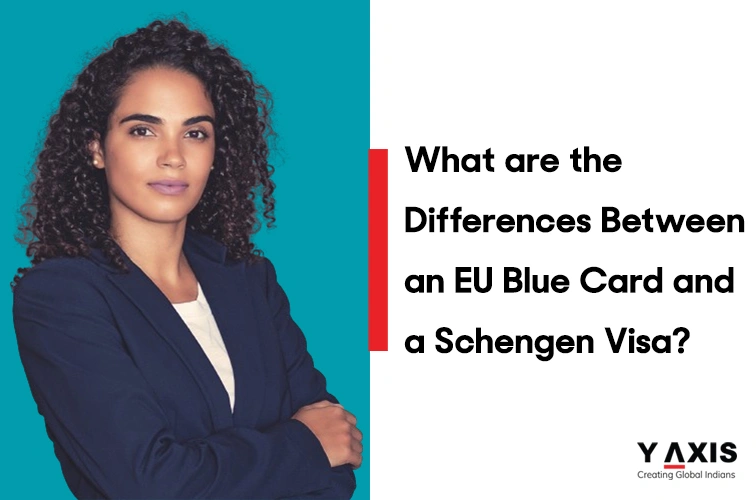Posted on October 10 2024
What are the differences between an EU Blue Card and a Schengen Visa?
By , Editor
Updated October 10 2024
An EU Blue card and a Schengen visa are both, particularly for non-EU citizens. An EU Blue card serves as a work and residence permit for highly qualified and talented non-EU citizens, while a Schengen visa is a short-term visit visa that lets non-EU citizens visit the Schengen area. The EU Blue card is issued by 25 European countries, excluding Denmark and Ireland, which is yet to implement it. Around 27 countries fall under the Schengen area, excluding Ireland and Cyprus. The EU Blue card and a Schengen visa facilitate entry to non-EU citizens for different purposes.
*Want to apply for an EU Blue Card? Sign up with Y-Axis for end-to-end assistance.
EU Blue Card vs. Schengen Visa
The table below lists the differences between an EU Blue Card and a Schengen Visa:
| Factors | EU Blue Card | Schengen visa |
| Type of visa | Residence and work permit | Short-term visit visa |
|
Eligibility Criteria |
Master’s degree, or a certificate in an equivalent program | Must be a non-EU citizens |
| Be a highly skilled professional | Must have an active passport | |
| Have a minimum of 5years of professional experience | Have €30,000 as medical travel insurance | |
| Have an employment contract in the EU state country |
The purpose of travel must be established |
|
| Fulfill the income requirements | ||
| Proof that you fulfill the national legal requirements (For regulated professions) | ||
|
Requirements |
Filled application form | Valid passport |
| Valid passport | Schengen visa application form | |
| Updated CV | Travel itinerary details | |
| Work experience of at least 5 years | Proof of funds | |
| Employment contract | Evidence that you will not be staying exceeding the visa duration (study status or employment contract) | |
| Proof of fee payment |
Medical insurance |
|
| Medical insurance | ||
| Proof that you met the minimum salary requirements | ||
| Criminal clearance certificate | ||
| A written declaration form the EU employer | ||
| List of countries | Austria, Belgium, Bulgaria, Croatia, Cyprus, Czech Republic, Estonia, Finland, France, Germany, Greece, Hungary, Italy, Latvia, Lithuania, Luxembourg, Malta, Netherlands, Poland, Portugal, Romania, Slovakia, Slovenia, Spain and Sweden. | Austria, Belgium, Bulgaria, Croatia, Czech Republic, Denmark, Estonia, Finland, France, Germany, Greece, Hungary, Iceland, Italy, Latvia, Liechtenstein, Lithuania, Luxembourg, Malta, Netherlands, Norway, Poland, Portugal, Romania, Slovakia, Slovenia, Spain, Sweden, and Switzerland |
| Can I apply for permanent residency? | Yes | No |
| Validity | 1-4 years | 90 days |
| Renewal? | yes | No |
| Application fees | Varies based on EU country | €90 |
| Processing time | 90 days | 15 days |
|
Pros |
Provides a PR pathway | Allows free travel within the Schengen area |
| Family Reunification | Gain access to Schengen countries sonly with a single visa | |
| Convenient entry and exit policies | Enter multiple times depending on your purpose of visit | |
| Free travel access within the Schengen area |
Travel to 29 countries |
|
| Allows you to bring your family | ||
|
Cons |
High salary requirements | Does not offer flexibility |
| Strict eligibility criteria | Does not allow longer stay in the country | |
|
Offers less flexibility |
Cannot apply for permanent residence | |
|
Cannot seek employment or take part I work-related activities |
*Are you looking for step-by-step assistance with Overseas Immigration? Contact Y-Axis, the world’s No. 1 overseas immigration consultancy, for end-to-end assistance!
Tags:
EU Blue Card vs. Schengen Visa
Overseas immigration
Schengen visa
EU Blue card
Visit visa
Schengen visit visa
non-EU citizens
EU member states
Overseas immigration
visit abroad
work abroad
migrate to Europe
Share
Options for you by Y-Axis
Get it on your mobile
Get News alerts
Contact Y-Axis

